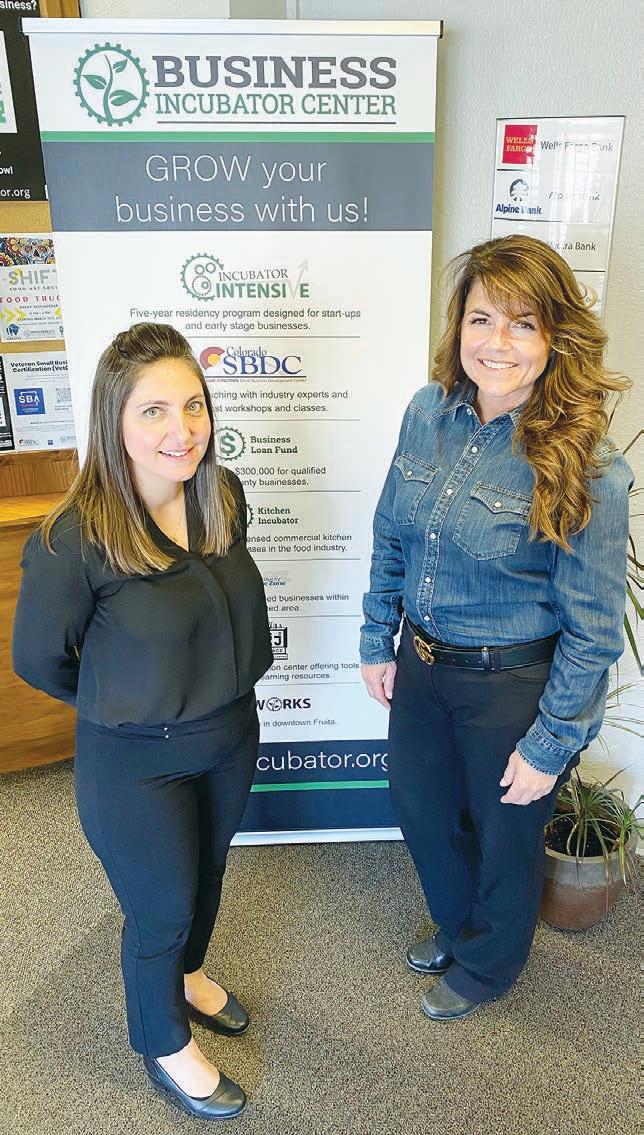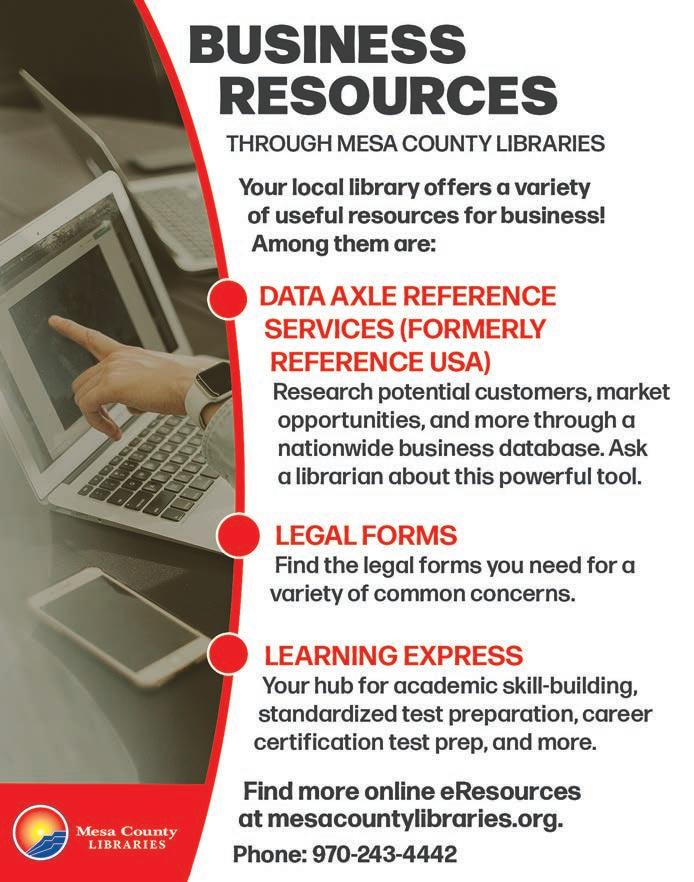In this issue
n Election results
Voters approved a measure to enable construction of a community rec center and also elected four to city council.

n Licensed to sell
Ten applicants received licenses to operate cannabis businesses in Grand Junction in a random selection process.
n She’s remarkable
The founder of a community outreach center received nationwide recognition as the Remarkable Woman of the Year.
2 4 5
n Housing efforts
n New program to offer training to community resource agencies. See page 2
Dalida Bollig, left, chief executive officer of the Business Incubator Center, and Lisa Mills, behavioral health strategies manager for Mesa County, have joined in an effort to provide business training to help community resource agencies.

6
A land acquisition program and accessory dwelling unit incentives are intended to address affordable housing issues.
n Lagging market
Real estate sales in Mesa County continue to lag behind last year, although increased activity is expected.
n Emergency over?
A public health emergency declared in response to the COVID-19 pandemic is expected to expire in May.
n Departments
BUSINESS TIMES News
Contributors Opinion Business Briefs Business People Almanac THEBUSINESSTIMES.COM THE DEFINITIVE SOURCE FOR GRAND JUNCTION BUSINESS NEWS SINCE 1994 APRIL 13-26, 2023 VOLUME 30, ISSUE 7
THE
Trends
Almanac 30-31 Business Briefs 28 Business People 30 Contributors 21-25 News 2-18 Opinion 26-27 Trends 19-20 PRSRT STD U.S. POSTAGE PAID PERMIT NO. 67 The Business Times 609 North Ave., Suite 5 Grand Junction, CO 81501 21 19
Business Times photo by Phil Castle
business
Taking care of
News Trends
Taking care of business
New program to provide business training for local community resource agencies

Lisa Mills admires the passion and commitment the people who run community resource agencies and institutions bring to their missions to help others.
“They’re more heart than anything else,” says Mills, behavioral health strategies manager for Mesa County.

Contributors Opinion Business Briefs Business People
But those people also could benefit, she says, from more knowledge of the management techniques that more typically apply to businesses — the accounting, budgeting and planning that sustain operations and also would better equip them to take advantage of the availability of increased funding.
That’s where Dalida Bollig believes the Business Incubator Center in Grand Junction can help in providing training and why she’s so excited about a new collaboration she expects will not only help meet community needs, but also create jobs and foster economic development. “It’s a win-win for everyone,” says Bollig, chief executive officer of the center.
It’s also a first-of-its-kind program that could serve as a model for efforts elsewhere in Colorado, she says.
Registration is under way for the first group of participants for the first of two training programs scheduled for this year. Each program will offer eight weeks of training and an additional eight weeks of one-on-one consulting. The programs are free.
Mills says community resource


FOR YOUR INFORMATION
For applications and more information about the business training program for community resource agencies, log on to https://tinyurl.com/adw2bhv4 or contact the Business Incubator Center at 243-5242 or frontdesk@gjincubator.org.
agencies and institutions traditionally depend on grants to fund their operations and consequently suffer through feast or famine cycles. But the settlement of lawsuits against the opioid drug industry has provided what she terms as “quite significant” long-term funding for substance abuse prevention, treatment and recovery programs.
It’s a matter, Mills says, of how agencies can increase their capacities and develop sustainable operations. Looking at those operations from a business management perspective could help, she says. “Business thinking is a very different process.”
Bollig says the Business Incubator Center provides free and low-cost training and counsulting as part of the services and programs offered there. Moreover, the entrepreuers who take advantage of those services tend to enjoy long-term success, she says. Most of their businesses remain in operation five years after starting.
See BUSINESS page 16
Voters approve rec center and elect four to council
Voters approved a ballot measure enabling the City of Grand Junction to proceed with plans to construct a community recreation center.
Voter also elected four people to the Grand Junction City Council. Cody Kennedy, Jason Nguyen and Scott Beilfuss won first terms on the council. Anna Stout was unopposed in her bid for a second term.

Referred Measure 1A on the municipal election ballot asked voters to decide on a proposed increase in city sales and use taxes from 3.25 percent to 3.39 percent to help finance construction and operation of a community recreation center.
According to final but still unofficial election results, the
measure passed with 10,954 yes votes to 7,177 no votes. Kennedy won in a District A race that also included Jamie Porta and Sanra Weckerly. Kennedy received 10,146
votes, while Porta received 3,564 votes and Weckerly 3,522.
Ngyuen won election in District B with 10,061 votes. Greg Haitz received 6,183 votes and Michael Deuel 894 votes.
In a closer race for an at-large seat on the council, Beilfuss edged out Diane Schwenke. Beilfuss received 8,621 votes, while Schwenke received 8,389 votes.
The city council adopted a community recreation center plan to construct the facility at Matchett Park with funding from the sales and use tax increase for as well as taxes on cannabis sales. See VOTERS page 18
TIMES
THE BUSINESS
Page 2 The Business Times aPril 13-26, 2023
STORY AND PHOTO BY PHIL CASTLE
Dalida Bollig, left, chief executive officer of the Business Incubator Center in Grand Junction, and Lisa Mills, behavioral health strategies manager for Mesa County, collaborated on a new program offering business training to help community resource agencies better manage their operations.
Cody Kennedy Jason NguyenAnna StoutScott Beilfuss

April 13-26, 2023 The Business Times pAge 3
City of Grand Junction selects licensees for cannabis businesses
Ten applicants have received licenses to operate cannabis businesses in Grand Junction.
The City of Grand Junction picked the 10 in a random selection that concluded an application process and came nearly two years after voters approved two measures to establish regulations and tax rates for retail cannabis sales.
Municipal Court Judge Dan Robinson and City Attorney John Shaver moderated the selection process at City Hall.
The business names of 32 applicants were printed on cards which were folded, sealed with a sticker and placed into an acrylic drum. The cards were drawn at random and each assigned a number from one to 32.
Thirty-two numbered balls were placed in a wire cage. As the cage was spun, the balls dropped into a chute. As each numbered ball dropped into the chute, the number was read aloud and the corresponding number placed on a city map. The marks on the map corresponded with location addresses, not the names of the applicants. Once 10 licenses were selected, a list of all the applicants was projected, highlighting those that could proceed to the steps necessary to secure a regulated cannabis business license.
Applicants selected for a cannabis license in the randomized process will be issued a city license after completing an application with the state. At the time of issuance of a license, the applicant is

AND THE WINNERS ARE
The 10 applicants selected to receive licenses for cannabis businesses in Grand Junction are:
n Canna Care.
n Colorado Weedery
n Elevate.
n The Garage.
n Golden Rookie.
n Grand Junction Greenery.
n Green Horizon.
n Kai Dispensary.

n Lucky Me Dispensary.
n Native Roots Grand Junction.
required to have paid all fees and must begin operations within 12 months of selection.

If a regulated cannabis business does not begin operations within 12 months of selection, the license shall be forfeited and the business may not start operation unless the hearing officer has granted an extension.
Taxes collected on retail marijuana sales will be earmarked to implement and enforce marijuana regulations as well as fund the highest priorities in a parks, recreation and open space master plan.
A portion of taxes also will fund a community recreation center as part of a measure city voters approved in the latest municipal election. F
Outdoor recreation grant to fund gravel biking guide
The City of Fruita is among the latest recipients of grants promoting outdoor recreation and workforce development in that industry.
The Colorado Outdoor Recreation Industry Office of the Colorado Office of Economic Development and International Trade awarded nine grants using funding from the U.S. Economic Development Administration. Since June, a total of more than $1.8 million has been awarded for 19 projects.

The City of Fruita received a $36,000 grant for the development of the Grand Valley Gravel Adventure Field Guide.
The City of Fruita will partner with the City of Palisade to market the Grand Valley as a destination for gravel biking enthusiasts.
The field guide will highlight gravel biking trails in Mesa County as well as other attractions, cultural heritage and history. The grant will cover research, design, illustration, printing and distribution of the guide.
In addition to promoting outdoor
recreation, the grants will fund professional development for more than 200 students and workers in the industry.
According to the U.S. Bureau of Economic Analysis, the outdoor recreation industry contributed $11.6 billion to the Colorado economy in 2021 — 2.7 percent of the overall economy.
A study conducted at Colorado Mesa University in Grand Junction estimated the direct economic effects of outdoor recreation in Mesa County at 4.8 percent of the total value of goods and services produced in the county.
“Across the state, the outdoor recreation industry is working to train and diversify the talented workforce that helps the industry thrive,” said Conor Hall, director of the Colorado Outdoor Recreation Industry Office. “We believe it’s key to support these efforts by improving access to certifications, professional development and the hands-on experiences that lead to successful careers in this important sector of Colorado’s economy.”
Page 4 The Business Times aPril 13-26, 2023 The Business Times 609 North Ave., Suite 5 Grand Junction, CO 81501 (970) 424-5133
The Business Times is published twice monthly and distributed throughout Grand Junction, Fruita and Palisade. Advertising rates and deadlines are available upon request. Opinions expressed in this publication are those of the writers and don’t necessarily reflect the views of the publisher, editor or advertisers. Copyright © 2023 — All rights reserved
www.thebusinesstimes.com
F
A Remarkable Woman: Joseph Center founder honored for her efforts
Media company bestows national recognition
The founder of a Grand Junction community outreach center offering a range of services to low income and homeless people has received nationwide recognition for her efforts.


Mona Highline, executive director of the Joseph Center, was named the latest winner of the Remarkable Woman of the Year award.

Nexstar Media presents the award as part of a nationwide initiative celebrating Women’s History Month and International Women’s Day. The award honors women who’ve influenced public policy, social progress and quality of life.
Highline and six other finalists were honored in events in Los Angeles that included an awards presentation at the TCL Chinese Theater. In addition to her award, Highline received a check for $10,000 to contribute to the public service organization or charity of her choice.
The finalists also will be featured in an hour-long program airing on Nexstar television stations across the country throughout April and on the NewsNation
cable news network at 8 a.m. April 16.
Nexstar received more than 10,000 nominations for the award. Nexstar television stations across the country each selected four women who were profiled on local newscasts throughout March. KREX in Grand Junction named Highline its Western Slope Remarkable Woman for 2023.
“Nextstar’s Woman of the Year initiative brings together our local communities and takes the recognition of women and their contributions in the workplace, the community and in the lives of others to a larger, national stage, demonstrating our ability to provide the concept, scale and platform to highlight the untold stories of exceptional women across the country,” said Andrew Alford, Nexstar president of broadcasting.
Highline joined with a group of women and in 2016 opened the Joseph Center to provide a safe place during the day for homeless families with children.
Since then, the Joseph Center has expanded to offer not only shelter and meals, but also assistance with applying for housing benefits, obtaining disability payments and searching for jobs.
Other programs offer food boxes, parent advocacy and temporary shelter and support services for middle-aged and elderly homeless women. The organization helps more than 600 individuals and families a year.
F
West Slope foundation moves into its new downtown home
The Western Colorado Community Foundation has moved into a newly renovated building in downtown Grand Junction.
The WCCF Center for Philanthropy is located at 128 N. Fifth St. in a building that once housed Roper Music.
The center includes 18 offices, three meeting rooms and a multi-purpose room for donor appreciation, networking and training events.
The center also includes an office that can be used by visiting foundation and nonprofit leaders.
The center constitutes the realization of a goal for the foundation to purchase its own office building.
“We were fortunate to find the perfect space downtown to grow and expand, and we realized how much the building characterizes our organization,” said Anne Wenzel, president and chief executive officer of the Western Colorado Community Foundation.
“We talk about being grounded in the past with the donors who helped start us by leaving gifts and whose shoulders we stand on,” Wenzel said. “That’s our foundation: grounded in the past, but modern and looking into the future; flexible and nimble, to be able to respond to current community needs. That’s what this organization does, and we feel this building exudes that.”
The Western Colorado Community Foundation serves seven counties in the region, managing more than 300 charitable funds with a total of $145 million in assets and awarding $5.5 million in grants and scholarships annually. F


April 13-26, 2023 The Business Times pAge 5
Mona Highline
Andrew Alford
Anne Wenzel
Nearly $3.4 million allocated to land acquisition effort
Nearly $3.4 million has been allocated to a land acquisition and building program intended to help alleviate a shortage of affordable housing in Grand Junction.
The Grand Junction City Council earmarked the money from $9 million in American Rescue Plan Act funding allocated to the city.
housing. Land and building acquisition costs, especially in developed area of the city, constitute a significant factor in the cost of developing affordable housing — about 10 percent to 15 percent of the overall project, Allen said.
underused properties for affordable and mixed income housing, Allen said. “This new program will create more opportunities for housing choices that meet the needs of people of all ages, abilities and incomes.”
The program will allow applicants to apply for funding to purchase land or buildings to build affordable units or convert existing structures into affordable units.
Tamra Allen
The program will provide funds to assist developers and nonprofit organizations acquire land or subsidize the cost to develop affordable housing.
Tamra Allen, community development director for the City of Grand Junction, said the program offers a way to overcome barriers in purchasing land to develop for affordable

“This program is really exciting for many of our local developers who often need to move quickly when opportunities arise to purchase land,” Allen said. “The new land and acquisition program provides support for those wanting to build affordable housing as land prices continue to increase and put affordability even further out of reach. In the absence of this program, developers would have to quickly identify grants which are extremely competitive and difficult to receive and or other financing that today comes with high interest rates.”
The program also fits with a city housing strategy of allocating city owned land or acquiring vacant or
Projects will be assessed based on four factors, including readiness and capacity, effects on housing needs, sustained and equitable support and sustainable development.
Projects under $300,0000 that meet or exceed expectations in all categories will be considered for funding through an administrative approval process rather than go to the city council for approval.
Workshops planned to detail program to spur building of accessory dwellings
Workshops are planned to detail a new program intended to promote the construction of accessory dwelling units to alleviate a shortage of affordable housing in Grand Junction.
An April 26 workshop is full. But another workshop is set for 5:30 to 7:30 p.m. May 2 in the HR training room at Grand Junction City Hall. Additional workshops will be offered on first-come, first-served basis.

Workshops are free, but participants must register at https://www.gjcity.org/ FormCenter/Community-Development-14/ ADU-Workshop-Sign-Up-103.
The Grand Junction City Council approved the program and allocated $250,000 to promote the construction of 16 to 26 additional accessory dwelling units over the next year. The program provides incentives to support the construction of accessory dwelling units within or attached to existing structures as well as units detached from principal structures, but built on permanent foundations.
The program features two tiers: one for those building new ADUs and one for properties occupied by owners.
For the first tier, the city will pay development impact fees as well as wastewater and city water plant investment fees. In exchange, the ADU must be built within one year and made available as a long-term rental for five years.
In the second tier, properties occupied by owners with household incomes of less than 140 percent of the area median will receive an additional incentive up to a total of $15,000. The owner must commit to an additional two-year term — seven years total — to operate the ADU as a long-term rental and live onsite.
Tamra Allen, community development director for the City of Grand Junction, said the program will help in providing more housing options for residents, including firefighters, police officers and teachers. ADUs also offer homeowners a way to earn additional income, Allen said.
Page 6 The Business Times aPril 13-26, 2023
F
F

April 13-26, 2023 The Business Times pAge 7
Colorado a top state for working from home
Colorado ranks as the 10th best state for working from home, according to a report from a personal finance website.
WalletHub compared the 50 states and the District of Columbia using 12 metrics to assess how feasible it is to work from home in terms of cost, comfort and safety.
By one estimate, 12.7 percent of full-time employees work from home, while 28.2 percent work under a hybrid schedule in dividing their time between the workplace and home. While more businesses embrace work from home, people might not always have the best environment for doing so, according to the report
Colorado ranked first for the median square footage per average number of persons in a household and second for the share of population working from home. The state ranked 14th for household internet access, 26th for internet cost and 29th
for average retail price of electricity.
Delaware ranked as the best state for working from home, followed by Utah, Maryland, Connecticut and New Jersey. The District of Columbia, Georgia, Arizona and Washington rounded out the top 10. Alaska ranked as the worst state for working from home. North Dakota, Montana, Arkansas and Mississippi rounded out the bottom five.
“The demand to work from home should continue to be strong throughout the rest of 2023 and increase into the future. Employers were forced to allow employees to work from anywhere during the pandemic, and that experiment largely proved successful,” said Joseph Broschak, an associate professor at the University of Arizona.
Applicants sought for apprentice program

Applications will be accepted through May 5 for grants promoting registered apprenticeship opportunities in Colorado.
Apprenticeship Colorado at the Colorado Department of Labor and Employment Office of the Future of Work seeks applications from employers and sponsors interested in developing apprenticeship programs.
Awards will range up to $50,000 and prioritize projects that embed diversity, equity, inclusion and accessibility in apprenticeships. Funds for the awards come from the Innovation, Diversity, Equity in Apprenticeship grant the U.S. Department of Labor awarded to the Colorado Department of Labor and Employment.
“Apprenticeships are critical to ensuring that Colorado’s businesses and workers are equipped with the talent and skills needed to thrive and modernize,” said Denise Miller, director of Apprenticeship Colorado. “By building a registered apprenticeship system across the state that reflects the diversity of our work force, we can help meet the needs of Colorado’s evolving economy.”
These grants will constitute the first funding opportunity available under the State Apprenticeship Agency. Grantees will benefit from the support of the Apprenticeship Colorado team and participate in a group of other employers launching apprenticeship programs.
Research on apprenticeship grantees indicates employers who invest in registered apprenticeship programs have a return on investment of $1.44 of benefits for every dollar spent. Employers report reduced turnover, improved work culture, enhanced co-worker productivity and a pipeline of skilled workers.
Apprenticeships also benefit workers, who are able to earn while they learn. Given that many people can’t afford to quit working to pursue training or education, apprenticeships can also help address inequities in the labor market.
For more information, including funding details and instructions on how to apply, visit the Apprenticeship Colorado website at https://apprenticeship.colorado.gov.
Page 8 The Business Times aPril 13-26, 2023
F
F Subscribe today to the journal that means business in the Grand Valley. (970) 424-5133 www.thebusinesstimes.com



April 13-26, 2023 The Business Times pAge 9
Colorado a top state for growth in franchises

Colorado ranks among the top 10 states in a report forecasting the growth of franchised businesses and jobs in 2023.
Colorado is expected to add 444 franchised businesses and create a total of 6,835 jobs, according to the International Franchise Association (IFA).
“Even with today’s economic headwinds, franchises in Colorado continue to grow, provide career-building jobs for their employees and give back to their communities,” said Matt Haller, president and chief executive officer of the IFA, a trade organization representing franchising worldwide.


“After an historic year of growth during the post-pandemic recovery, franchising is predicted to exceed pre-pandemic growth levels, showing the power of the business model and its distinct advantages for prospective business owners,” Haller said. According to the report for Colorado for 2023, franchise establishments are expected to increase 444 units to a total of 17,901 units.
Franchise businesses will create 6,835 jobs, bringing total payrolls to 193,190. Economic output by franchise businesses will increase 4.9 percent to $19.1 billion.
States in the Southwest and Southeast are expected to experience the fastest franchise business growth in 2023.
In addition to Colorado, the top 10 states for franchise growth in 2023 are projected to include Arizona, Florida, Georgia, Illinois, Indiana, North Carolina, South Carolina, Tennessee and Texas.
The Southeast region, which has the largest concentration of franchises in the United States, will have an estimated 234,079 total establishments by 2023 employing 2.5 million workers and contributing $250 billion in output.
Nationwide, franchise establishments are forecast to increase by almost 15,000 units in 2023 to 805,000 units.

Service-based industries and quick service restaurants are expected to grow the fastest.
Franchising will add about 254,000 jobs as employment reaches 8.7 million. The total output of franchised businesses will increase 4.2 percent to $860.1 billion.
Franchises’ share of the overall economy will remain stable at 3 percent. Compared with 2022, the monetary value of all the finished goods and services produced by franchises will grow at a slightly slower pace of 4.2 percent.
Page 10 The Business Times aPril 13-26, 2023
F
Matt Haller



April 13-26, 2023 The Business Times pAge 11
Cattlemen’s convention set for June
Registration is under way for the Colorado Cattlemen’s Association annual convention.
The three-day convention is set for June 19 to 21 at the Steamboat Grand in Steamboat Springs and will include meetings, educational presentations, networking, awards presentations and a trade show.
The convention is set to start June 19 with committee meetings. Lunch will include the presentation of the Colorado Leopold Conservation Award. A welcome reception is planned that evening to greet trade show exhibitors and sponsors.
The convention will continue June 20 with what’s billed as a “grab and stay” networking breakfast at the trade show. After breakfast, attendees will participate in the 6th annual ranching legacy symposium. The symposium will include industry and issues updates from state and federal partners as well as presentations from agency partners, experts and industry stakeholders. In the
FOR YOUR INFORMATION
To register or obtain more information about the Colorado Cattlemen’s Association annual convention, visit www.coloradocattle.org or call (303) 431-6422. The association also is accepting sponsors and trade show vendors for the convention.
afternoon and evening, a mountain meat-up will feature award presentations and leadership recognition.
The convention will conclude June 21 with a beef and business breakfast, which will include updates from local affiliates and affiliated organizations. The association business session will be conducted after breakfast.
Hotchkiss ranch among finalists for conservation recognition
A family ranch in Western Colorado is among three finalists for an annual award recognizing conservation efforts.
The LeValley Ranch near Hotchkiss is among the finalists for the 2023 Colorado Leopold Conservation Award.
This year’s recipient will be announced prior to Earth Day on April 22. The formal award presentation will take place in June at the Colorado Cattlemen’s Association annual convention in Steamboat Springs.
Named in honor of the conservationist Aldo Leopold, the award recognizes ranchers, farmers and forestland owners who inspire others with their dedication to land, water and wildlife habitat management on private, working lands.
The Sand County Foundation and national sponsor American Farmland Trust present the Leopold Conservation Award to landowners in 27 states for achievement in voluntary conservation.
In Colorado, the $10,000 award is presented with the Colorado Cattlemen’s Association, Colorado Cattlemen’s Agricultural Land Trust, USDA-Natural Resources Conservation Service, American AgCredit, CoBank, Farm Credit of Southern Colorado, and Premier Farm Credit.

The LeValley family’s rangeland conservation practices and irrigation upgrades have increased water efficiency, biodiversity, crop production and wildlife habitat on their cattle ranch in Delta and Montrose counties.
A deferred grazing system, specialized water infrastructure and the removal of invasive trees and shrubs have all been implemented to provide critical habitat for endangered Gunnison sage grouse.
The other finalists are the Chico Basin Ranch in Colorado Springs and Round River Resource Management of Rush.
“Colorado farming and ranching families proudly produce the food that feeds a growing society and provide invaluable benefits to their communities and the environment,” said Philip Anderson, the president of the Colorado Cattlemen’s Association.
“CCA celebrates the Leopold Conservation Award finalists and applicants for their commitment to outstanding stewardship practices and conservation achievements on working lands,” Anderson said.
F
Page 12 The Business Times aPril 13-26, 2023
F



April 13-26, 2023 The Business Times pAge 13
Lottery revenue hits funding cap for fiscal year
Revenue from the Colorado Lottery has hit the revenue cap for the 2023 fiscal year.
Reaching the cap on March 20 wss the earliest date in the 40-year history of the lottery.

The Lottery will allocate more than $75.7 million in proceeds to Great Outdoors Colorado to fund parks, recreation, conservation and open space projects across the state.
“We are thrilled that so many Coloradans enjoy the games offered by the lottery and sold through our network of 3,000 retailers across the state,” said Tom Seaver, director of the Colorado Lottery. “We’re also thrilled that so much funding will be available for GOCO to support their incredible work. This also means the lottery will need to responsibly grow our revenue to ensure support for our other beneficiaries like BEST and the Outdoor Equity Fund. Those funds will only receive lottery revenue after we reach the GOCO cap.”
Seaver said several factors contributed to lottery revenue, including two billion dollar plus jackets for Mega Millions and Powerball, plus a dueling jackpot that reached more than a combined billion dollars. Revenue from scratch products also was a factor.

Next fiscal year, Great Outdoors Colorado will see the largest increase in funding from the Lottery in history due to inflation increases. By state law, the GOCO cap is adjusted annually based on the Consumer Price Index for the Denver metropolitan area for the preceding calendar year.

“Congratulations to Colorado Lottery, its proceeds partners and all Coloradans who will benefit from this awesome achievement,” said Jackie Miller, executive director for GOCO. “We are proud to partner with communities from the Western Slope to the Eastern Plains to invest proceeds in the highest and best uses in our state’s great outdoors.”
Since 1983, the Colorado Lottery has returned more than $4 billion to outdoor projects and schools through Great Outdoors Colorado, the Conservation Trust Fund, Colorado Parks and Wildlife and Building Excellent Schools.
To date, GOCO has invested more than $48.4 million in projects in Mesa County and partnered to conserve 18,284 acres.
F

Page 14 The Business Times aPril 13-26, 2023
Tom Seaver



April 13-26, 2023 The Business Times pAge 15
Business
Continued from page 2
That training and consulting also can help those who run community resource agencies, including nonprofits, Bollig says.
The training will begin with intake interviews to introduce participants to the program and identify the specific challenges they face with their operations.
Subsequent sessions at the Business Incubator Center will cover such topics as business planning, corporate governance, operating plans and procedures, monitoring and evaluation, budgeting, credentialing, human resources management and applying what participants learn to their operations. The program will continue with one-on-one consulting and implementation.

Jeff Engle, director of the Small Business Development Center at the Business Incubator Center, will work with participants as will other members of the team at the center, Bollig says. Outside experts also will assist with the training.
Mills says one of the main goals of the effort is to help agencies and institutions scale up their operations to increase their capacities to serve clients, but do so in a way that’s sustainable over the long run. The needs, Mills says, are great.
Bollig says the program will not only help meet needs in the community, but also foster economic development. As agencies and institutions grow, they’ll hire more people. That kind of effort fits within the mission of the center to improve the strength and sustainability of business operations, she says.
The team at the center is excited to launch the program, she says.
If the program works as expected in Mesa County, it could be replicated elsewhere in Colorado, she says.
Mills says the people who run community resource agencies and institutions and bring passion and commitment to their missions are eager to add to those attributes business acumen. “They’re very excited.”
Oil and gas panel sets April 13 meeting in Glenwood Springs
The Colorado Oil and Gas Conservation Commission has scheduled a meeting in Glenwood Springs to offer information about a state law changing the mission of the commission as well as take public comments.
The meeting is set for 3:30 to 5:30 p.m. April 13 in the Devereux Room of the Hotel Colorado, 526 Pine St.

State law changed the mission of the commission from fostering oil and natural gas development to regulating development to protect public health, safety, wildlife and the environment.
The commission has planned trips across Colorado to communities where there’s oil and gas development.
For additional information about the commission, visit cogcc.state.co.us.

Page 16 The Business Times aPril 13-26, 2023
F
F




April 13-26, 2023 The Business Times pAge 17
Grant to fund upgraded lighting at Grand Junction parks
The City of Grand Junction was awarded a $555,000 grant that will fund lighting upgrades at four city parks.
The city received the Safer Streets Grant from the Colorado Department of Public Safety Division of Criminal Justice.
The Grand Junction Parks and Recreation Department will use the funding for upgraded lighting at Columbine, Hawthorne, Sherwood and Whitman parks. Funding also be used to provide secure storage containers for parks equipment.
The upgrades and storage are intended to improve the
usability and safety of parks while deterring vandalism and other crimes.
“The city is focused on ensuring the community’s parks are safe and comfortable, especially with increased use due to warmer weather that is right around the corner,” said Ken Sherbenou, city parks and recreation director. “This generous grant is just the most recent of our efforts to improve the parks with a particular focus on those that are historic and located in the heart of our city.”
Voters
Continued from page 2
The measured approved by voters allows the city to increase debt up to $70 million with a repayment cost of $148.5 million to construct, equip and operate a community recreation center.
The center is expected to include a multi-sport gymnasium, fitness and weights area, indoor track and meeting rooms as well as an aquatic center with a lap pool, leisure pool, lazy river and water playground.
Voters also approved a second referred measure on the ballot allowing the city to lease a parcel on Struthers Avenue near Las Colonias Park to Colorado Discover Ability. The nonprofit organization provides adaptable outdoor recreation to people with disabilities.
The four people elected to the Grand Junction City Council will bring varied experiences to their positions.
Kennedy operates a rental homes business. He retired after 17 years as a Grand Junction police officer.
Nguyen works as a site manager for the U.S. Department of Energy.
A retired sales representative and small business owner, Beilfuss has been active in community issues and politics.

Stout serves as the executive director of the Roice-Hurst Humane Society. She was first elected to the council in 2019. She’s since served as mayor pro tem and mayor.

Page 18 The Business Times aPril 13-26, 2023
F
F
INDICATORS AT A GLANCE
n Business filings
s New business filings in Colorado, 48,806 in the fourth quarter, up 37.2 percent from the fourth quarter of 2021.
n Confidence
s Consumer Confidence Index 104.2 for March, up 0.8.
s Leeds Business Confidence Index for Colorado, 45.1 for the second quarter, up 5.3.
t National Federation of Independent Business Small Business Optimism Index 90.1 for March, down 0.8.
n Foreclosures
t Foreclosure filings in Mesa County, 19 in March, down from 54 in March 2022.
t Foreclosure sales in Mesa County, 1 in March, down from 5 in March 2022.
n Indexes
t Conference Board Employment Trends Index,116.24 for March, down 0.51.
t Conference Board Leading Economic Index 110 for February, down 0.3%.
t Institute for Supply Management Purchasing Managers Index for manufacturing, 46.3% for March, down 1.4%.
n Lodging
s Lodging tax collections in Grand Junction, $254,659 for December, up 16% from December 2021.
n Real estate
t Real estate transactions in Mesa County, 328 in March, down 33.7% from March 2022.
t Dollar volume of real estate transactions in Mesa County, $136 million in March, down 33% from March 2022.
n Sales
s Sales and use tax collections in Grand Junction, $6 million for December, up 7.4% from December 2021.
s Sales and use tax collections in Mesa County, $3.7 million for February, up 3.1% from February 2022.
n Unemployment
s Mesa County — 3.8% for February, up 0.1.
s Colorado — 2.9% for February, up 0.1.
t United States — 3.5% for March, down 0.1.
Real estate activity lags
But demand expected to counter effects of higher interest rates
Phil Castle Business Times
Real estate activity continues to slow in Mesa County compared to what was a more active market a year ago.
Contributors Opinion Business Briefs

But sales picked up between February and March, a trend that’s expected to continue into the spring and summer as pent-up demand counters the effects of higher interest rates on mortgages.
of $312 million were reported. That’s down about 38 percent from the first quarter of 2022, a decline Young attributed to higher interest rates on mortgages that make real estate less affordable. According to numbers Bray & Co. tracks for the residential real estate market in Mesa County, 253 transactions worth a total of more than $105 million were reported in March. Compared to the same month a year ago, transactions declined 24.9 percent and dollar volume fell 23.8 percent.
Business People Almanac
Robert Bray, chief executive officer of Bray & Co. Real Estate in Grand Junction, said he anticipated what could become “fairly intense” activity given competition for what remains low residential inventories.


Annette Young, administrative coordinator at Heritage Title Co. in Grand Junction, welcomed month-to-month increases in transactions and dollar volume. Year-over-year comparisons won’t be as meaningful until the second half of the year, she said.

Young said 328 real estate transactions worth a total of $136 million were reported in Mesa County in March. That’s up from 212 transactions worth a combined $83 million in February. Compared to March 2022, however, transactions and dollar volume were both down about 33 percent.
Eight transactions worth a collective $17 million bolstered dollar volume in March 2023, Young said, including the sales of the Rocky Mountain Gun Club and shooting range for $6.25 million, an industrial and manufacturing facility for nearly $2.4 million and an orchard with a fruit stand and residences for $2.2 million. Still, 15 transactions worth a total of $31 million were reported for the same month last year.
For the first quarter of 2023, 754 transactions worth a total
Through the first quarter of 2023, 558 transactions worth a total of nearly $227 million were reported. Compared to the first quarter of 2022, transactions and dollar volume were both down about 29 percent.
“Interest rates are really driving most of that,” Bray said. Otherwise, the economy remains strong and so does demand, he said.
Stewart Cruickshank, sales manager at Bray & Co., agreed. “We do know there is pent-up demand.” Houses priced at below $400,000 often draw multiple offers, Cruickshank said.
As of the end of March, there were 433 active residential listings in Mesa County. That’s up nearly 86 percent from a year ago, but has declined to its lowest level since May and constitutes only a 2.8-month supply at the current pace of sales.
New home construction continues to lag as a result of higher interest rates and uncertainty, Bray said. Through the first quarter of 2023, 102 building permits for single family homes were issued in Mesa County. That’s less than half the 237 permits issued during the first quarter of 2022.
The combination of continued demand and less supply could push prices back up. The median price of homes sold in Mesa County in the first quarter of 2023 slipped $3,000 to $365,000 compared to the same quarter in 2022. But the median price of homes sold in March edged up $3,000 to $370,000 compared to the same month a year ago.
Property foreclosure activity remains low, Young said. For the first quarter of 2023, 66 foreclosure filings and eight sales were reported. That’s down from 80 filings and seven sales for the first quarter of 2022.
Index: Small business owners less confident
A measure of confidence among small business owners has declined on less upbeat expectations for sales, hiring and other factors.
The Federation of Independent Business reported its Small Business Optimism Index fell eight-tenths of a point to 90.1 in March. The index has remained below its historical average of 98 for 15 consecutive months.
“Small business owners are cynical about future economic conditions,” said Bill Dunkelberg, chief economist of the NFIB. “Hiring plans fell to their lowest level since May 2020, but strong consumer spending has kept Main Street alive and supported strong labor demand.”
The NFIB bases the index on the results of monthly surveys of members of the small business advocacy group, most of them small business owners.
For March, six of 10 components of the index retreated, three advanced and one held steady from February.
The proportion of NFIB members responding to the survey upon which the March index was based survey who expect the economy to improve remained unchanged. But at a net negative 47 percent, more respondents anticipated worsening conditions.
A net 20 percent reported plans for capital outlays, down a
point from February. A net 2 percent said they consider now a good time to expand, down four points.
A net 15 percent reported plans to increase staffing, down two points. A net 43 percent reported hard-to-fill job openings, down four points. While 26 percent reported few qualified applicants for open positions, 27 percent reported they were none.
The share of survey respondents who expected increased sales fell six points. At a net negative 15 percent, more expected decreased sales.
Expectations for profits increased five points. But at a net negative 18 percent, more respondents anticipated lower profits.
Among those reporting higher profits, 48 percent attributed the gain to increased sales, 21 percent cited higher prices and 5 percent credit lower labor costs. Among those reporting lower profits, 31 percent blamed weaker sales and 23 percent cited rising material costs.
The proportion of respondents planning to increase inventories fell three points to a net negative 4 percent. A net 1 percent said inventories were too high, up five points
Asked to identify their single most important business problem, 24 percent cited inflation. A net 37 percent of respondents reported raising average selling prices. Price hikes were most frequent in the wholesale, retail and construction sectors. Quality of labor came in a close second as the most important problem.
F April 13-26, 2023 The Business Times pAge 19 News
Trends
F
Bill Dunkelberg
Robert Bray
Annette Young
S. Cruickshank
Payrolls grow, but more slowly
Payrolls continue to grow in the United States, but at a slowing pace.
Nonfarm payrolls increased 236,000 and the unemployment rate edged down a tenth of a point to 3.5 percent in March, the U.S. Bureau of Labor Statistics reported.
The estimated payroll gain for February was revised upward 15,000 to 326,000. But the gain for January was revised downward more — 32,000 to 472,000.
With the latest revisions, payrolls have increased an average of 334,000 a month over the past six months.
For March, 5.8 million people were counted among those unsuccessfully looking for jobs. Of those, 1.1 million have been out of work 27 weeks or longer. Another 4.1 million were counted among those working part-time because their hours were cut or they were unable to find full-time positions.

The labor participation rate inched up a tenth of a point to 62.6 percent, but remained below the rate posted before the onset of the COVID-19 pandemic in the U.S. in early 2020. Payroll gains for March were spread out among a number of industry sectors.
Employment increased 72,000 in leisure and hospitality, 39,000 in professional and business services, 34,000 in health care and 17,000 in social assistance. Government payrolls increased 47,000.

The average work week shortened a tenth of an hour to 34.4 hours. The average manufacturing work week held steady at 40.3 hours.
Average hourly earnings rose 9 cents to $33.18. Over the past year, average earnings increased 4.2 percent.
Labor index drops
A monthly index tracking labor trends has declined, signaling slowing employment growth.
The Conference Board reported its Employment Trends Index fell about a half a point to 116.24 in March.

While industries continue to add jobs where labor shortages persist, rising interests could trigger jobs losses in the second half of 2023 and early part of 2023, said Selcuk Eren, a senior econmist at the Conference Board.

Page 20 The Business Times aPril 13-26, 2023
F
F
COMING ATTRACTIONS
n A variety of presentations are planned at the Business Incubator Center in Grand Junction.
An online presentation on enhancing engagement to increase profitability is set for 10 to 11 a.m. April 13. Erin Young, a small business owner and employer coach with the Colorado Workforce Development Council, will discuss job quality and why it matters.
Opinion Business Briefs Business People Almanac
A class on completing Colorado sales tax returns is set for 1:30 to 2:30 p.m. April 13 at the center, located at 2591 Legacy Way.
The Colorado Department of Transportation has scheduled a workshop on civil rights and labor compliance regulations for 9 a.m. to 4 p.m. April 26 at the center. Admission is $25.
The next monthly maker meetup is set for 6 to 8 p.m. May 1 at the GJ MakerSpace at the center.
To register for or obtain more information about upcoming events, programs and services at the Business Incubator Center, call 243-5242 or log on to https://gjincubator.org.
n The Fruita Area Chamber of Commerce has scheduled its annual member banquet for 5 to 10 p.m. April 15 at the Fruita Community Center, 324 N. Coulson St.
The event will include a cocktail hour, appetizers, dinner, an awards ceremony and live entertainment. Admission is $75 for individuals, $700 for a table for eight.
For additional information or reservations, call 858-3894 or visit the website located at https://fruitchamber.org.
n The next Coffee Club free networking meeting is set for 9 to 10 a.m. April 21 at the FWorks co-working space at 325 E. Aspen Ave. in Fruita. The event also will include a workshop on business valuations.
For more information, call 858-3894 or visit https://fruitachamber.org.
n Colorado Mesa University has scheduled its Entrepreneurship Day luncheon for noon May 2 at the University Center Meyer Ballroom in Grand Junction.
Corey Ciocchetti, an author and college professor, is expected to deliver the keynote address on leadership and inspiring ethical integrity and character.
Tickets sell for $65. Table and leadership sponsorships also are available. For tickets or more information, visit the website located at www.SupportingCMU.org/Eday.
Emergency end in sight?
What does the expiration of declaration mean for employers?
It’s been more than two years since the U.S. Department of Health and Human Services created a new normal for employers in declaring a public health emergency (PHE) in response to the COVID-19 pandemic. The effort included new employment laws and new interpretations of existing laws while increasing telecommuting and other alternative arrangements.
Since the peak of the Omicron variant of COVID-19 in January 2022, HHS reported daily reported cases of COVID-19 have dropped 92 percent even as COVID-19 deaths have declined more than 80 percent and COVID-19 hospitalizations have decreased nearly 80 percent.
Consequently, HHS plans for the public health emergency for COVID-19 to expire May 11.
President Joe Biden announced federal public health declarations would end on that date.
In Colorado, a spokesperson for Gov. Jared Polis responded to this news: “Gov. Polis is thrilled that the White House intends to finally provide an end date for the federal emergency. Colorado was one of the first states to end pandemic-related health restrictions in July 2021 and was one of the first states to reopen and get kids back in school. The current Colorado declaration contains no restrictions and is focused on the state remaining eligible for funding under the federal emergency declaration, and the state declaration will not outlast the end of the federal declaration. ”
It appears the end is in sight. Under Colorado law, an employee may use PHE leave for a qualifying absence for four weeks after the end of the PHE declaration — June 8.
I’m fielding questions from employers, though, on what happens to supplemental PHE leave that’s unused. And what happens if another PHE is declared?
First, the status of supplemental leave depends on what type of leave was used to supplement employees’ existing banks of employer-provided leave. In the best-case scenario, the employer granted a bank of supplemental leave separate from regular sick, vacation or paid time off the employer used for qualifying PHE-related absences. In the worst-case scenario, the employer merely added hours to employees’ existing vacation or PTO banks.
Colorado law is clear that once vacation is accrued, it’s earned and can’t be forfeited. Colorado regulations treat PTO as vacation leave for purposes of leave accrual. Think of vacation or PTO leave as water in a bucket. If an employer poured more water into the bucket without limitations, there’s no way to separate the water by source now.
But every situation depends on facts specific to that situation. An employer who provided an employee supplemental PTO, but specified the PTO was provided only to satisfy the requirements of the Healthy Families and Workplaces Act (HFWA) and was available only until the end of the PHE, could have the ability and right to withdraw that supplement. Employers should seek legal counsel before withdrawing any awards of additional PTO or vacation.
The situation is probably even less clear for employers who awarded additional sick leave to satisfy the supplemental leave requirement. Sick leave is required in Colorado, and regulations treat sick leave as “wages.” But the HFWA states that unlike vacation leave, an employer isn’t required to pay out unused sick leave balances upon termination of employment. An employer who tracked the amount of supplemental sick leave awarded and used could be able to deduct those hours since they’re not subject to requirements to pay unused sick leave. Again, employers should seek legal counsel on this matter.
In light of recent outbreaks of swine flu, avian flu, influenza and respiratory syncytial virus as well as COVID-19, it’s likely the state or federal governments will declare a new PHE in the future. Now is the time for employers to decide how they will award and administer supplemental PHE leave. Many employers misunderstood the supplemental leave requirement. Colorado law never required a supplement of a straight 80 hours. The law required and still requires an employer provide a one-time supplement at the time the PHE is declared of enough leave when combined with other accrued and available leave to allow the employee to take up to 80 hours of leave for PHE-qualifying reasons.
Now’s the time to determine what type of leave will be awarded. The time to determine how much leave will be awarded is on the day a PHE is declared or an employee is hired, not when the employee needs the leave. What approach employers will use in the next PHE will depend on existing leave programs, payroll system limitations and how an employer balances fiscal considerations with simplicity of administration.
The Employers Council is available to advise consulting and enterprise members on modifying its policies and practices ahead of the next public health emergency.
Dean Harris is the Western Slope area managing attorney for the Employers Council. The Employers Council counsels, represents and trains member employers in all phases of employment relationships. For more information, contact Harris at (970) 852-0190 or dharris@employerscouncil.org.

HR group to host presentation on changes in retirement planning
The Western Colorado Human Resource Association has scheduled a luncheon meeting and presentation on changes to retirement planning.
The event is set for 11:30 a.m. to 1 p.m. April 19 at the Mesa County Workforce Center, 519 29 1/2 Road in Grand Junction.
The presentation also will be available virtually.
Ben Rizzuto, a retirement director for Janus Henderson Investors, will lead a presentation on

recent legislative changes affecting retirement planning. A version of the Setting Every Community Up for Retirement Enhancement (SECURE) Act enacted late in 2022 includes provisions affecting retirement plans and individual retirement planning.
Rizzuto works with financial advisors, platform partners, Janus Henderson colleagues and clients to address retirement issues. He hosts the Plan Talk podcast and contributes to the insights section of the Janus Henderson Investors website.
Prior to joining Janus in 2014, he worked as a business development consultant for Jackson National Life, where
he helped financial advisors grow their fee-based practices. Rizzuto brings to his duties 18 years of experience in the financial industry. He holds the FINRA Series 7 and 66 securities licenses as well as the Certified Financial Planner and Chartered Retirement Plans Specialist designations.
Members of the WCHRA may attend the meeting at no additional charge. Guests pay $20. Members of the Society of Human Resource Management Club at Colorado Mesa University may participate for $5.
To register or obtain additional information, log on to www.wchra.org.
April 13-26, 2023 The Business Times pAge 21 Trends
Contributors
F
Dean Harris
F
Ben Rizzuto
Mentor your team members to think for themselves
There’s a tendency among business owners and managers to supply answers rather than help team members find answers.
There’s a prevailing belief this saves time. While that might be accurate in the short term, this approach actually costs more time over the long run. It also weakens your business and adds to your responsibilities as your team remains dependent upon you for solutions.
Business owners and managers frequently ask me, “How do you teach people to think?” It’s a powerful question that can lead to a significant improvement in results. The answer: By learning to become a mentor and effective communicator who consistently encourages team members to think for themselves.
Thinking is the process of evaluating a situation and then exploring possible actions that will lead to a solution or desired outcome. If you want your company to operate at the highest levels, your team members must be taught it’s acceptable — and continually encouraged — to think their way through situations rather than relying upon you and others for answers or guessing at solutions.
How do you use effective communication to encourage people to think for themselves?
Begin by creating a safe environment for your team members to ask questions. This is accomplished through composure — not becoming angry, condescending, demeaning, disappointed or frustrated as you work together toward a viable solution. Ensure it’s safe for them to reveal what they don’t know as they work with and learn from you.
People who don’t feel safe asking questions will often guess what action is best to take or take no action
at all. This leads to errors that can ripple throughout operations. Accounts aren’t handled effectively, time and resources are wasted, customers become disgruntled and business suffers. This, in turn, will result in more time and resources spent to fix both the error and relationship with the customer.
Encourage team members to come to you with questions rather than guess about the correct course of action to take. Help team members realize there’s strength in tapping available resources to foster learning and understanding that leads to solutions.

Here’s a critical component to success: Rather than simply telling your team members the correct answers, take time to work with them. Ask them open-ended questions as they explore the situation. This will allow everyone involved to develop greater clarity as you work together for a solution.
Ask team members what possible solutions they see. Continue asking open-ended questions to fully draw out their perspectives. If their perception of the situation isn’t accurate, continue asking questions to help them deduce the solution or send them in the direction of information that holds the solution.
Finally, have them teach you what they learned. This will let you know whether more work is needed and help them further ingrain what they’ve learned.
Over time, you’ll learn how to best mentor each individual. Team members will learn they can collaborate with you to improve their abilities to make sound decisions. This creates a strong bond between you and your team. Your team will become more competent, fewer errors will be made and the company will deliver far better experiences to customers.
Keep in mind most people have been conditioned through a lifetime of experiences in which they were told what to do, who to be and how to think to rely on others for answers.
When this previous conditioning is understood and overcome, individuals access more of their potential and perform at higher levels.
You have a choice to make about the development of team members: You can either increase their dependency upon you for solutions or empower them to look for and find answers on their own.
When you invest in your team members and their ability to think their way through a given situation to a successful solution, you help them to help themselves. This grows their abilities, lessens their dependence on you for answers, strengthens your business from within and improves your company’s performance.
Marcus Straub owns Life is Great Coaching in Grand Junction. His personalized coaching and consulting services help individuals, business owners, executives and companies build teams, organizations and lives filled with happiness and success. Straub is winner of the International Coach of the Year Award and author of “Is It Fun Being You?” He’s available for free consultations regarding coaching, speaking and trainings. Reach Straub at (970) 208-3150, marcus@ligcoaching.com or through the website located at www.ligcoaching.com.


F Page 22 The Business Times aPril 13-26, 2023
Marcus Straub
People who don’t feel safe asking questions will often guess what action is best to take or take no action at all. This leads to errors that can ripple throughout operations.
With contract work, pay correct wages
Do you work on federal, state or other government contracts?
Do you understand what it means to pay employees according to Davis-Bacon or Colorado prevailing wage scales?
Many small business owners bid — often as subcontractors — on projects on which one or the other of the wage scales, or both, apply. However, business owners often aren’t aware, or really understand, these wage scales must often be used. In many cases, although not all, these wage scales are higher than what workers are normally paid.
While it’s tempting to pay employees less to make a bid more competitive, the risks and resulting costs and penalties aren’t worth it. Business owners should consult with an employment law lawyer or an organization such as the Employers Council for guidance.
How do you know if these wage scales apply to you?
Davis-Bacon wages generally apply to nearly every construction, alteration or repair of public buildings or public works project that receives public funds.
There are two components: wages and fringe benefits. The wages component is determined based on federal government surveys to determine prevailing wages for workers in commercial, heavy, highway and residential construction. The scale determines the minimum hourly rates paid workers during the duration of the contract.
According to the U.S. Department of Labor, the wage rates for bona fide supervisory employees aren’t regulated under the Davis-Bacon and related acts because their duties are primarily administrative or executive in nature. However, employees who devote more than 20 percent of their time during a work week to mechanic or laborer duties are laborers and mechanics for the time so spent and must be paid at least the appropriate wage rates specified in the wage determination. Employees who are bona fide executive, administrative or professional employees as defined under the Fair
Labor Standards Act aren’t covered by the Davis-Bacon Act. Colorado prevailing wages apply to most state projects. According to the Colorado Department of Labor and Employment, state projects that don’t receive federal funding, aren’t covered by federal prevailing wage requirements or aren’t awarded by the Colorado Department of Transportation, require weekly payment of prevailing wages to laborers, mechanics and other construction workers employed on public projects pursuant to a contract of $500,000 or more with an agency of state government and each subcontract awarded thereunder. In many cases, the Colorado prevailing wage follows the Davis-Bacon wage scale. But always check with CDLE to ensure you use the correct rate.
In addition to the wage component, there’s a fringe benefit component. A sample wage determination for Mesa County highway construction, including the fringe benefit amount, is available at https://drive.google.com/file/d/103kPg3FSlYly5duuhK1u00laBo6bGT4/view. This determination offers a useful starting point. What goes into fringe benefit determinations? The costs of contributions for such benefits as health and life insurance, holidays, vacations, sick leave, pension plans and other bona fide benefits. Payments required by federal, state or local law don’t count — payments for Social Security, unemployment compensation and workers’ compensation, for example.
Davis-Bacon wage determinations from the U.S. Department of Labor are available at sam.gov/content/wage-determinations. Additional information is available at https://cdle.colorado.gov/ wage-and-hour-law/prevailing-wages.

This column isn’t intended as benefits, legal, tax or other advice. Always consult with licensed professional advisors.

Janet Arrowood is founder and managing director of the Write Source, a Grand Junction firm offering a range of services, including grant and proposal writing, instruction and technical writing. Reach her at janet.arrowood@thewritesourceinc.com. For more information, log on to www.TheWriteSourceInc.com.


April 13-26, 2023 The Business Times pAge 23
F
Janet Arrowood
Expand influence through emotional intelligence

As social creatures who constantly interact with others in our professional and personal lives, we experience emotions throughout the day. Our relationships with others affect our success and happiness. But how do we navigate these connections with emotional intelligence? How do we manage these encounters for the best possible outcomes?
By using emotional intelligence and understanding our circle of influence, we can improve professional and personal relationships. Let’s delve into the intersection of these two ideas and how we can benefit from them.
For starters, what does emotional intelligence mean? It’s recognizing, understanding and managing our emotions as well as identifying and influencing the emotions of others. This proves important in the workplace as we traverse situations loaded with emotions. Understanding how emotions affect behavior helps us read situations correctly, identify emotional cues and react appropriately. There are four attributes involved in developing and maintaining this tool:
n Self-awareness — in tune and honest about our strengths, weaknesses and triggers. Realizing each of us exerts influence and affects others.
n Self-management — express emotions appropriately in changing situations. Often this requires resisting the urge to react instead of methodically acting proportionately to the circumstances.
n Empathy – understand someone else is going through something to which you might not be able to relate.
n Nurturing relationships – focus on building relationships within an organization and determine whether

or not relationships are more important than conflicts.
Incorporating emotional intelligence training into employee orientations yields numerous benefits, including improved communication and coping skills as well as less time spent on conflict management. Regardless of the industries or positions, all employees can benefit from such training both professionally and personally. In experiencing less turmoil in their personal lives, employees are less likely to bring drama into the workplace and remain more engaged while they’re there.
Now, let’s turn to our circle of influence. We all have three circles that govern our interactions and problemsolving abilities. The first circle is what we can control — our thoughts, reactions and behaviors. The second circle is how, what or whom we influence, including relationships, communications and motivation. The third and largest circle encompasses what we’re concerned with, whether or not we exert control over it. Understanding the difference in our circles allows us to focus on the inner two and not waste time or resources on matters outside them.
Since the circle of influence starts with individuals, employees have the potential to exert influence by their attitudes, performances and relationships with colleagues and customers. Individual influence ripples outward, affecting the team, department and organization in positive or negative ways.
Emotional intelligence increases the circle of influence by helping employees navigate professional or social situations with greater ease and effectiveness. When we become aware and accepting of our own emotions, trigger points, strengths and weaknesses and those of others, we communicate more rationally, empathize within the situation and strengthen work relationships. Building this brand of self-management projects a positive image to others, inspiring them to follow our example as trustworthy and reliable people. This can lead

to greater respect and cooperation with others and in turn expands the circle of influence.
By being emotionally intelligent, we can also manage conflicts and difficult conversations in constructive ways, which can further enhance our ability to influence others to chose more productive paths. Learning this concept enables us to tailor our communication style to the situation and audience whether we want to educate, influence or call others to action.
Finally, by understanding what motivates people and connecting with them on an emotional level, we can inspire them to take action aligning with organizational goals. This can be especially valuable in a leadership role, where the ability to inspire others affects employee engagement, customer satisfaction and company reputation.
All of us encounter emotionally charged situations at work and in our personal lives. Emotional intelligence among leaders and employees benefits an organization with productive communication techniques and effective conflict resolution methods. Expanding our workplace circle of influence involves developing emotional intelligence by acknowledging and managing our emotions, recognizing those of others and adapting communication styles accordingly. Practicing these skills improves leadership as well as professional and personal success.
Kelly Murphy works as a senior human resources business partner at Lighthouse HR Support in Grand Junction. She holds designations as a Professional in Human Resources and Society for Human Resource Management Certified Professional. Lighthouse HR Support offers human resource services for small and medium-sized businesses. For more information, call 243-7789 or visit www.lighthousehrs.net.
F
Page 24 The Business Times aPril 13-26, 2023
Kelly Murphy
Advisors play crucial role in business success


In today’s competitive landscape, running a business is no easy feat — even in Colorado.
According to a recent article in Forbes magazine, Colorado ranked as the second-best state in which to start a business.
From developing a business plan to navigating legal requirements and managing finances, there are many complex tasks involved in starting and running a successful business. This is where a business advisor can serve as an invaluable resource.
Business evaluations constitute an essential tool for identifying areas for improvement and making informed decisions. They can provide a comprehensive analysis of any business operation. By conducting an evaluation, businesses gain a deeper understanding of their operations. This information can be used to reduce costs, increase profitability and improve performance.
If the idea of selling is in the future, business owners must prepare their business to maximize the potential value of their assets and streamline the sales process.
Conversely, if buying a company is on the horizon, future business owners must identify specific acquisitions
and investment criteria as well as prospective firms based on cultural alignment. That’s not to mention avoid pitfalls along the way.
As technology continues to disrupt traditional business models and customer expectations evolve, businesses must remain agile. A well-crafted strategic plan can help companies stay ahead of the curve, identify new opportunities and recognize and eliminate weaknesses.
Hiring a business advisor can be a viable option to find ways to meet needs and goals. By partnering with an advisor, businesses benefit from years of experience and expertise in various areas, including finance, legal compliance, marketing and operations.
Kyle Serrano, a business intermediary with Bray & Co. Real Estate in Grand Junction, says there’s no tailor made way to structure the right deal in buying and selling companies. “There are many different terms and conditions to negotiate and work through in these transactions, most
of which could have large implications on future business success, profit, taxes, legal liability, etc. It is important to make sure you understand all the variables at play or work with someone who can counsel you through those items.”
Regardless of growth or industry, business advisors can identify opportunities and potential problems, create financial plans, navigate the legal landscape and develop effective sales strategies.
As a bonus, their network of contacts could prove invaluable in introducing you to potential clients, investors and partners as well connecting you to other business owners who can provide insights and support.
The Bray & Co. Business Advisors Group provides comprehensive services to help businesses achieve goals and reach new heights of success. With our expert guidance and support, you can navigate the complex world of business operations, finance and management with ease.
Michelle Urlacher is president of Bray & Co. Real Estate based in Grand Junction. She brings to her duties more than 20 years of experience in the real estate industry, including positions as an analyst, appraiser, marketing director, property manager and transaction coordinator. For more information about Bray & Co., call 242-3647 or log on to www.brayandco.com.
Worth celebrating: Public health fosters community health
National Public Health Week celebrated in early April offers a time to recognize the contributions of public health organizations.
Sarah Gray
Our mission at Mesa County Public Health (MCPH) is to work together to anticipate and respond to conditions that affect the health of residents and visitors in Mesa County. We go beyond a traditional public health approach, however. We know health doesn’t start in the doctor’s office. It starts where we live, work, learn and play. We see the interconnectedness of businesses, nonprofit groups and government.
“Our collaborative approach is unique. Our teams are all connected to a bigger picture. We’re not just working to make the community healthier and safer today. We’re improving systems that lead to sustained change over time,” said Jeff Kuhr, executive director of MCPH.
Part of our approach includes looking at conditions in communities that affect health and well-being.
“Our environment impacts our health in a significant way,” Kuhr said. “How close do you live to a grocery store that has fresh fruit and vegetables? Do you have a park in
your neighborhood or a safe, walkable trail? We like to step back and look at these conditions.”
We improve the health of residents by addressing certain factors:
n Strengthen economic resilience through an economy that supports the local workforce.
n Increase access to preventive health care and mental health services.
n Improve the environment and conditions for people to choose healthy lifestyles.
n Foster social connectedness across neighborhoods.
We work with partners to address these factors and find solutions unique to Mesa County. More than 50 partners work with us on different initiatives — among them the Clifton Community Transformation Group promoting connection and a sense of community in Clifton.
We work to support families and help them become more economically stable. Our Grand Valley Connects team provides resources and enrollment support for services. Our WIC team serves 2,800 families each month with each family receiving about $100 worth of healthy foods. This enables families to pay for other needs.
We understand child care is essential economic infrastructure and work to improve the quality and quantity of child care in Mesa County.
Our team helps create environments that promote

health and safety. In 2022, MCPH performed more than 500 inspections at restaurants, body art parlors, swimming pools and schools. We work with businesses every day to make sure they’re operating safely.
Meanwhile, the trails crew built nearly 10 miles of trail at 18 Road to provide easier access to outdoor recreation.
By offering these services and resources, MCPH gives residents the opportunity to thrive at home and work.
We’re grateful to serve the community and our local businesses and look forward to expanding our programs. For example, our regional lab is expanding to provide more services. We’re also launching in-person food safety courses.
“Improving the quality of life for people in Mesa County is at the heart of what we do. Our focus in 2023 is continued innovation. We’re excited to continue our work to improve and expand the systems that support the health and well-being of our community,” Kuhr said.
Public health is community health. The effects of one person receiving our services or using our programs stretches far beyond that individual and helps create healthier workplaces and a healthier community.
Sarah Gray is a communication specialist with Mesa County Public Health. For additional information, call 248-6900 or visit https://health.mesacounty.us. F

April 13-26, 2023 The Business Times pAge 25
F
Michelle Urlacher
By partnering with an advisor, businesses benefit from years of experience and expertise in various areas.
Some taxing concerns: Less government waste might improve attitudes
“It’s income tax time again, Americans: Time to gather up those receipts, get out those tax forms, sharpen up that pencil and stab yourself in the aorta.” — humorist Dave Barry.
An income tax is defined as a tax levied by a government directly on personal income. Passed by Congress on July 2, 1909 and ratified Feb. 3, 1913, the 16th Amendment to the Constitution established the right of Congress to impose a federal income tax.
Since then, about half of federal revenue has been generated from income tax collections.
But according to 2016 data from the Urban-Brookings Tax Policy Center — a nonpartisan think tank in Washington, D.C. — 44 percent of Americans paid no federal tax.
It’s unclear if this data included the tens of thousands of federal employees who’ve failed to file tax returns for multiple years — as reported by Zachary Steiber in the Epoch Times on March 14, 2023. Steiber reported the number of delinquent federal workers has jumped to 149,000 — or about 5 percent of the federal civilian workforce. More than 19 percent of non-filers earn $100,000 or more, yet only 10 federal workers were penalized from the 2016 through 2020 fiscal years.
What’s wrong with this picture?
Aimee Picchi, a business reporter for CBS MoneyWatch wrote a Dec. 2, 2022 article headlined “The Labor Force is Shrinking.” Picchi identified a number of reasons for the trend: child care and health care issues, retirements and an unwillingness to work. She wrote: “The dichotomy of job growth combined with a shrinking pool of workers underscores the tensions facing the U.S. economy at a precarious moment.”
Nicholas Eberstadt, a political economist with the American Enterprise Institute, wrote that for every 25- to 54-year-old person out of work and looking for a job in 2022, there were four people who were neither working nor looking for work. Eberstadt wrote: “Americans have been renowned for their work ethic, but the future of that work ethic should not be taken for granted.”
According to the U.S. Bureau of Labor Statistics, the labor participate rate has fallen to an all-time low of 62 percent.
Eberstadt wrote: “What this trend has meant is slower economic growth for the country, wider income and wealth gaps,

Preparing for the worst: SBA can help businesses with their disaster planning

History shows that 25 percent of businesses that close because of a disaster never reopen. Following the COVID-19 pandemic, tens of thousands of small businesses nationwide never recovered and simply closed their doors forever. Many of us have seen the devastation wildfires, floods and tornadoes wreak on a business community and the years of recovery that ensue.
The golden rule for disaster preparedness is to increase awareness, develop action plans and practice them regularly. The U.S. Small Business Administration (SBA) can help.
Disasters inflict devastating effects on communities
Unfortunately, Colorado is prone to a variety of natural disasters — including floods, drought, tornadoes and wildfires. One of the most destructive disasters occurred in 2013, when more than 10 inches of rain fell in a 24-hour period and inundated Boulder and surrounding areas. Flash floods killed eight people and damaged nearly 20,000 homes and hundreds of small businesses. Only a year ago, the Marshall Fire destroyed or damaged more than 1,000 homes and 30 businesses in Boulder County.
more dependence on government welfare programs, more pressure on fragile families, less mobility, less involvement in society and a lot more deaths of despair.”
Maybe the dread that accompanies payment of income tax is well-deserved. But along with dread can be a sense of unfairness when reading how many individuals choose not to pay taxes or work.
The federal government needs revenue to perform the basic role as identified in the Constitution. If the government continues to expand beyond the role established by our founders, there could come a time when even more citizens find ways to not pay income taxes. This trend of growing government programs on the backs of a declining number of taxpayers is unsustainable.
Free market policies that boost economic activity, incomes and wealth have demonstrated a bigger economy generates more tax revenue.
Curtailing frivolous and wasteful government spending might improve taxpayer attitudes about paying income taxes. Changing the incentive structures for those unwilling to work could result in more workers contributing to economic growth, societal stability and revenue.
Income taxes might be necessary. But stop wasting taxpayer money.
Phyllis Hunsinger is founder of the Freedom & Responsibility Education Enterprise Foundation in Grand Junction. The FREE Foundation provides resources to students and teachers in Western Colorado to promote the understanding of economics, financial literacy and free enterprise. A former teacher, principal and superintendent, Hunsinger wrote “Down and Dirty: A ‘How To’ Math Book.” Reach Hunsinger at phyllis@free-dom.us.com. For more information about the FREE Foundation, log on to the website located at www.free-dom.us.com.

Establishing a disaster recovery plan makes good business sense. Being prepared for any kind of emergency means you’ll rebound sooner with less effects to your financial capabilities. Creating a recovery plan also can provide you and your employees peace of mind in knowing what to do if disaster strikes.
Here are four critical steps a small business owner can take to prepare for a possible disaster:
n Review your business insurance to determine what’s included in the policy and whether’s its sufficient to cover possible losses. Understand that most business policies don’t cover flood damage. Check into business interruption insurance, which covers operating expenses if you’re forced to temporarily close. Review if your policy covers business shutdowns caused by such events as pandemics and other health emergencies.
n Develop professional relationships with alternate vendors in case your primary supplier isn’t available. Place occasional orders with them so they’ll regard you as an active customer. Create a contact list for important business contractors and vendors you plan to use in an emergency. Keep this list with other documents in an easily accessible place at a protected off-site location.
n Create a crisis communications plan to communicate with your staff, customers, vendors and contractors following a disaster. Secure primary and secondary email addresses for your contacts and update this list regularly. Use social media channels to provide real-time updates to your customers and community about your business.
n If you sell goods, innovative technology or manufactured products, your inventory could be your most important asset. Plan to relocate your most valuable inventory during an emergency. Your inventory could also be your data. Ensure your business data is secured in the cloud and backed up on a removable storage device suitable for a grab and go situation.
Following a declared disaster, the SBA helps rebuild communities by providing affordable, timely, direct loans to businesses of all sizes, nonprofits, homeowners and renters to cover uninsured losses. Developing a workable disaster recovery plan is critical for entrepreneurs.
Aikta Marcoulier serves as the U.S. Small Business Administration Region VIII administrator. She oversees SBA programs and services in Colorado as well as Montana, North Dakota, South Dakota, Utah and Wyoming. Frances Padilla serves as the SBA Colorado District director and oversees programs and services across the state. For more information, visit www.sba.gov or follow the agency on Twitter @SBArockymtn and @SBA_Colorado.
April 13-26, 2023 The Business Times pAge 27
YOUR VIEWS The Business Times welcomes guest columns and letters to the editor on issues affecting businesses in western Colorado. Submissions should be emailed to phil@thebusinesstimes.com and include names and telephone numbers for verification.
SHARE
F
Phyllis Hunsinger
Curtailing frivolous and wasteful government spending might improve taxpayer attitudes about paying income taxes. Changing the incentive structures for those unwilling to work could result in more workers contributing to economic growth, societal stability and revenue.
F
Aikta Marcoulier
Frances Padilla
n GRAND JUNCTION REAL ESTATE COMPANY RANKS AMONG TOP BROKERAGES NATIONWIDE
Opinion Business Briefs Business People Almanac
RE/MAX 4000 in Grand Junction ranks among the top real estate firms nationwide in two annual compilations.
RE/MAX 4000 ranked fifth in the 2023 Real Trends 500 for transaction sides per agent. The brokerage was 460th out of the top 500 brokerages by sales volume in a separate ranking compiled by RIS Media.
“This is a testament to the teamwork this office has,” Joe Tripoli, managing broker of RE/MAX 4000, said of the Real Trends ranking. “Being in the top five for the second year in a row, I am proud to work alongside the most professional Realtors in the valley that continue to produce outstanding results. We will continue this trend and provide the service and results our clients have come to expect.”
Tripoli also hailed the RIS Media ranking. “This is an amazing accomplishment from our team.”
Founded in 1990 as RE/MAX The Grand Junction Real Estate Group, the name was changed in 1994 to RE/MAX 4000. Toni Charlesworth owns the company.

RE/MAX 4000 operates offices at 120 W. Park Drive, Suite 200. For more information, call 241-4000 or visit the website at www.gjproperties.com.
n ALPINE BANK SCHEDULES SHRED EVENTS AT TWO GRAND JUNCTION LOCATIONS
Alpine Bank has scheduled benefit document shredding events for April 15 and 22 at two Grand Junction locations.
Community shred day events are set for 9 a.m. to noon April 15 at the downtown location at 225 N. Fifth St. and 9 a.m. to noon April 22 at the Horizon Drive location at 709 Horizon Drive.
The events will offer participants a chance to securely destroy old documents, including bank and medical records, credit card bills and tax documents. Participants may bring up to four bankersized boxes of documents.
Although the event is free, donations will be accepted April 15 for Crime Stoppers of Mesa County and on April 22 for Mesa County Partners.
Headquartered in Glenwood Springs, Alpine Bank operates locations across Colorado and serves more than 160,000 customers. For more information, visit www.alpinebank.com.
NOTEWORTHY SHARE YOUR NEWS
The Business Times welcomes submissions for free publication in Business Briefs. Email items to phil@thebusinesstimes.com or submit a news release online at www.thebusinesstimes.com.
n MEMBERS OF BUSINESS ORGANIZATIONS COLLECT GOODS AND CASH FOR FOOD BANK
Members of five Grand Valley business organizations collected enough donated goods and cash in 90 minutes to provide more than 2,500 meals to the community.
The latest Grand Valley BizMix event was conducted at the Food Bank of the Rockies in Grand Junction and brought together members of the Fruita, Grand Junction, Palisade and Western Colorado Latino chambers of commerce as well as the Young Professionals Network of Mesa County.
Gabriela Garayar, development manager at the food bank, praised the effort. “It truly takes igniting the power of community to nourish our neighbors, who often face making difficult choices every day.”
Candace Carnahan, president and chief executive officer of the Grand Junction Area Chamber of Commerce, said the BizMix events foster relationships and collaborations. “Creating an opportunity for our combined memberships to strengthen their network for resources, peers and leads is something that strengthens all of us.”
The next Grand Valley BizMix event is set for July at the Imondi Wake Zone in Fruita.

n GRAND VALLEY TRANSIT CHANGES HOURS FOR SATURDAY SERVICE IN GRAND VALLEY
Grand Valley Transit has changed service hours on Saturdays on its bus routes in the Grand Valley.
The new service hours will begin and end two hours later than weekday service. Depending on the route, service will begin from 6:45 to 8:15 a.m. and continue until 9:15 to 9:45 p.m.
To celebrate the change, free rides on fixed routes will continue on Saturdays through April.
For additional information about Grand Valley Transit, routes and schedules, visit gvt.mesacounty.us.
Applications sought for agriculture industry leadership grants
Applications will be accepted through May 1 for a grant program promoting development and training programs in the agricultural industry.
The NextGen Leadership Grant program will provide up to $25,000 in funding per project with up to $120,000 available.
“Programs qualifying for NextGen ag leadership grants must help lead new people into careers in the food and agriculture industry and help prepare them to become the industry’s leaders of tomorrow and beyond,” said Tom Lipetzky, director of the markets division at the Colorado Department of Agriculture. “CDA is focused on expanding access to learning and leadership opportunities for future generations in agriculture.”
Agricultural organizations and educational institutions may submit applications that show their proposed programs meet one or more priorities. Those priorities include developing individual leadership and entrepreneurial skills, enhancing organizational leadership and capacity building and creating educational and training opportunities.
A committee will review applications and make recommendations to the Colorado commissioner of agriculture for approval. Projects must be completed by the end of the state fiscal year.
Grant applications may be submitted through the website located at ag.colorado.gov/nextgen.
Red Rock Auto Group in Grand Junction donated more than $100,000 to the School District 51 Foundation.
The $104,600 contribution was the result of a promotion the auto sales company launched in December to donate $100 to the foundation on behalf of each customer who purchased a car.
“The Red Rock Auto Group is excited to give back to the community, and what better way to do it than investing in the education of our youth,” said Bryan Knight, platform manager. “We understand that a solid investment in children’s education will promote a much stronger community. We are in this for the long haul, and are excited about being a small part of this wonderful cause.”
Angela Christiansen, executive director of the School District 51 Foundation, said the contribution will support students and staff. “I want to say how honored we are to receive this generous donation from the Red Rock Auto Group in support of the work we do throughout School District 51.”
The company also was a celebration level sponsor of the foundation’s latest White Iced Celebration, Christiansen said.

Doug Simons Jr., a member of the School District 51 Foundation board, also hailed the donation. “The D51 Foundation works tirelessly to support the students and teachers within the district, and this kind of assistance goes a long way in making sure they can continue this mission.”
Red Rock Auto Group operates Red Rock GMC, Red Rock Honda, Red Rock Hyundai, Red Rock Kia and Red Rock Nissan. In addition to selling new and used vehicles, the company offers auto maintenance and repairs and stocks parts. For additional information, visit the website at www.rrgjco.com.
Page 28 The Business Times aPril 13-26, 2023
F
F
C. Carnahan
Joe Tripoli



April 13-26, 2023 The Business Times pAge 29
Business People Almanac Business Briefs Business People Almanac
n CMU ALUMNI ASSOCIATION ANNOUNCES INAUGUARAL WINNERS OF AWARDS
Brittani Martin and Lori Mizushima have been recognized for their support of Colorado Mesa University based in Grand Junction.
Martin received the Doug Sortor Maverick Spirit Award. Mizushima received the Honorary Maverick Alumni Award.
The CMU Alumni Association will present the inaugural awards during a CMU baseball game set for April 15. Martin and Mizushima will throw out ceremonial first pitches for the game.
The Doug Sortor award was named in memory of a man who long served as a role model for students and alumni. Sortor attended and played football for what was at that time Mesa College. He later served as president of the CMU Alumni Association and received the Distinguished Alumni Award in 2021.
The Doug Sortor Maverick Spirit Award honors alumni who support and promote CMU and Western Colorado Community College. The selection criteria for the honorary alumni award is the same, but recognizes a recipient who isn’t a CMU or WCCC alumni.
Martin, card and client services lead at Timberline Bank in Grand Junction, attends CMU sports events and frequently dresses in Mavericks gear to support the team and university.
Mizushima, director of marketing for Big O Tires, speaks with and mentors marketing students at CMU and has hired alumni as marketing assistants. She joins with her brother, Ryan Mizushima, in hosting an annual crab fest fund-raiser to support CMU wrestling teams.
n AUTHOR LAUNCHES EFFORTS TO PROMOTE BOOK ABOUT COPING WITH PARENTAL LOSS
Dave Blincoe has launched efforts to promote a book he’s written for people who’ve experienced grief and other emotions over the loss of a parent.
Blincoe plans to make the book, titled “Notions of Being Broken Branches,” available through a web site he expects to soon complete at www.redmoonpublishing.com.
He said his intended audience is anyone who’s lost a parent and experiences grief from that loss, regardless of their gender or the reason for the loss.
He said the book is based in part on his experiences as a teen-ager after he was abandoned by his father and his subsequent study of trauma. Blincoe said he promised himself if he recovered from his grief and depression, he would tell others how the healing process occurred.
He said his mother remarried and the family moved from an urban to a rural setting. He said he found solace in walking and exploring his stepfather’s property.
Blincoe can be reached at dave@redmoonpublishing.com or dave.mountainlakes@gmailcom.
SHARE YOUR NEWS
The Business Times welcomes submissions for free publication in Business People and the Almanac calendar of events. Email submissions to phil@thebusinesstimes.com or submit a news release online at www.thebusinesstimes.com.
n WEST SLOPE REAL ESTATE FIRM NAMES COMMERCIAL PROPERTY MANAGER





Max Taylor has been named commercial property manager for Bray & Co. in Grand Junction. Taylor succeeds Jami McLennan, who worked with the firm 10 years. In his new role, Taylor will assist property owners with property management on sales and leasing. He brings to his duties four years of experience as a broker with Bray Commercial.
“With Max’s prior experience in leasing and sales, it gives Bray property management clients another advantage in navigating the impacts of proven property management practices,” said Cindy Hoppe, property management director. “We are the only company on the Western Slope that has a true commercial manager that understands the intricacies of how good property management practices can positively impact an asset valuation.”
Bray & Co. provides a range of services related to residential and commercial real estate as well as property management and construction. For more information, call 242-3647 or visit www.brayandco.com.
n GRAND JUNCTION REAL ESTATE BUSINESS NAMES BEST-SELLING AGENTS FOR MARCH
Cynthia Castaneda and Toni Heiden were honored as the best-selling agents for March at Heiden Homes Realty in Grand Junction.
Castaneda posted the most closed transactions. Heiden posted the highest dollar volume in closings for the month.
Castaneda has worked as a real estate professional since 2007.
Heiden is the owner and broker of Heiden Homes Realty and brings to her duties more than 45 years of experience in the Western Colorado real estate market. The National Association of Realtors recognized her in 2018 with emeritus status as a Certified Residential Specialist.
Heiden Homes Realty operates offices at 735 Rood Ave. For more information, including listings for sale and rent, visit www.heidenhomes.com or call 245-7777.
April 13
n Grand Junction Small Business Development Center online presentation on enhancing engagement to increase profitability, 10 to 11 a.m. 243-5242 or https://gjincubator.org
n Class on state sales tax returns, 1:30 to 2:30 p.m., Business Incubator Center, 2591 Legacy Way, Grand Junction. https://gjincubator.org or 243-5242
n Fruita Area Chamber of Commerce business after hours, 5:30 to 7 p.m., Western Colorado Community College, 2508 Blichmann Ave., Grand Junction. Admission $5 for chamber members, $10 for others. https://fruitachamber.org or 858-3894
April 15
n Fruita Area Chamber of Commerce member banquet and awards presentation, 5 to 10 p.m., Fruita Community Center, 324 N. Coulson St. Admission $75 for individuals or $700 for a table of eight. https://fruitachamber.org or 858-3894
April 19
n Western Colorado Human Resource Association membership luncheon and presentation on changes to retirement planning, 11:30 a.m. to 1 p.m., Mesa County Workforce Center, 512 29 1/2 Road, Grand Junction. Members attend at no additional charge. Others pay $20. www.wchra.org
n Young Professionals Network of Mesa County lunch conversation, noon to 1 p.m., Blythe Group, 622 Rood Ave., Grand Junction. www.ypnmc.org
n Palisade Chamber of Commerce business after hours, 5:30 to 7 p.m., Palisade Brewing Co., 200 Peach Ave. Members pay $5 in advance and $6 at the door. Others pay $8 in advance and $10 at the door. 464-7458 or https://palisadecoc.com
April 21
n Coffee Club free monthly networking meeting and workshop on business valuations, 9 to 10 a.m., FWorks, 325 E. Aspen Ave., Fruita. 858-3894 or https://fruitachamber.org
April 25
n Grand Junction Area Chamber of Commerce business after hours, 5:30 to 7 p.m., Center for Children, 2350 G Road. Admission $10 in advance, $12 at the door. https://gjchamber.org or 242-3214
April 26
n Colorado Department of Transportation workshop on civil rights and labor compliance regulations, 9 a.m.to 4 p.m., Business Incubator Center and online. Admission $25. 243-5242 or https://gjincubator.org
n Fruita Area Chamber of Commerce Women in Business charcuterie board class, 5 to 7 p.m., Copper Club, 153 N. Mulberry St., Fruita. Admission $75 for members and $80 for others. https://fruitachamber.org or 858-3894

Upcoming
n Western Colorado Economic Summit, 7 a.m. to 2 p.m. April 27, Colorado Mesa University, 1100 North Ave., Grand Junction. 245-4332 or www.westcoeconomicsummit.org
See ALMANAC page 31
Page 30 The Business Times aPril 13-26, 2023 Opinion Business
Briefs
Brittani Martin
Lori Mizushima
F
Max Taylor
C. Castaneda
Toni Heiden
Almanac
Continued from page 30
Upcoming
n Welcome Thursday Friends free networking group, noon to 1 p.m. April 27, Mike’s Famous Chicken, 233 E. Aspen Ave. Fruita. https://fruitachamber.org or 858-3894
n Young Professionals Network of Mesa County business after hours, 5:30 to 7 p.m. April 27, Blue Moon Bar & Grille, 120 N. Seventh St., Grand Junction. www.ypnmc.org
n Monthly maker meetup 6 to 8 p.m. May 1, GJ MakerSpace at the Business Incubator Center. 243-5242 or https://gjincubator.org
n Colorado Mesa University Entrepreneurship Day luncheon featuring keynote speaker Corey Ciocchetti, noon May 2, University Center Meyer Ballroom,
Grand Junction. Admission $65. Table and leadership sponsorships available. www.SupportingCMU.org/Eday

n Fruita Area Chamber of Commerce Women in Business monthly networking luncheon, noon to 1 p.m. May 4, Business Incubator Center. Admission $15 for members, $25 for others. https://fruitachamber.org or 858-3894
n Fruita Area Chamber of Commerce business after hours, 5:30 to 7:30 p.m. May 11, Western Colorado Pediatric Associates, 3150 N. 12th St., Grand Junction. Admission $5 for members, $10 for others. https://fruitachamber.org or 858-3894
n Grand Junction Area Chamber of Commerce Networking at Noon, noon to 1 p.m. May 17, Spoons Bistro & Bakery, 3090 12th St., Grand Junction. Admission $20 for chamber members and $25 for
others. https://gjchamber.org or 242-3214

n Palisade Chamber of Commerce business after hours, 5:30 to 7 p.m. May 17, Blaine’s Farm Store, 3419 Front St., Clifton. Members pay $5 in advance and $6 at the door. Others pay $8 in advance and $10 at the door. 464-7458 or https://palisadecoc.com

n Western Colorado Human Resource Association legislative conference, 8 a.m. to 5 p.m., May 23, Colorado Mesa University Center ballroom. Virtual attendance also available. Admission $199 for members, $299 for others through April 23. Afterwards, admission $249 for members and $349 for others. www.wchra.org
n Welcome Thursday Friends free networking group, noon to 1 p.m. May 25, Munchies, 550 Kokopelli Drive, Fruita. https://fruitachamber.org or 858-3894
April 13-26, 2023 The Business Times pAge 31
F

Page 32 The Business Times aPril 13-26, 2023





























































































